Aristotle Biography 8: Lyceum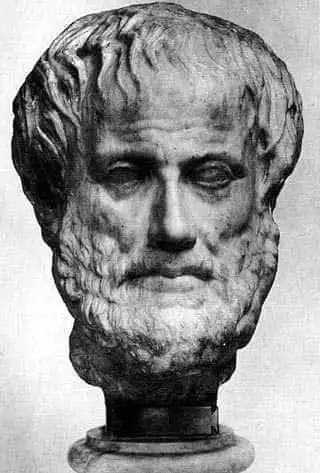 The life and time of the Greek PhilosopherLyceum
Although Aristotle's relation to the magnificent ruler Alexander may have been less than perfect, it granted him a significant though reluctant respect from the Athenians, when Aristotle returned to their city in 335 to open his own school, at the Lyceum. It was an ambiguous kind of respect, since the Athenians nourished considerable hostility toward Macedonia, including its king and any friend of his. Aristotle would be wise enough not to provoke them by making excessive use of their fear of his mighty protector.
A recent assumption, by F. Grayeff, is that already king Philip hoped for Aristotle to become the head of the Academy, since Speusippus was strongly opposed to Macedonian domination of Athens. Speusippus died in 339, a time when Athens was beginning to move toward a revolt against Macedonia and the treaty with Philip from the year 346. Aristotle was probably one of the candidates proposed for head of the Academy, but not more so than that the vote was between Xenocrates, whom Speusippus himself had wanted to succeed him, Menedemus of Pyrrha, and Heraclides of Pontus. If Aristotle was indeed suggested for the post, it was probably not taken very seriously, either from the members of the Academy or from Aristotle himself. Grayeff states that Aristotle was rejected because he lived in Macedonia at the time. A decent argument indeed, and still Grayeff claims that Philip kept Aristotle in Macedona to prepare him for taking over the Academy. If such a suggestion had come from Philip or anyone on his behalf, this could only have led to endless complications for Aristotle especially if he would have won the position as scholarch. Such Macedonian mingling with Athenian affairs would cause more of a stir in Athens than an anti-Macedonian leader of the school could possibly raise. And how could Aristotle hope to recruit students to the school among the Athenian nobles? He would have been the last person to wish for such an outcome.
And Philip was a king lacking little of his son's force, so he would not have been that bothered with what was said among scholars, as long as warriors did not respond and then he would have dealt with the situation in a likewise manner as his son did in 335, when Athens tried a revolt. This being the very year when Aristotle opened his school gives food for thought. Philip probably payed little attention to who led the Academy, but Alexander may very well have been pleased, if not even instrumental, when the rival school was opened by his former tutor. Still, he did protect the Academy, as well. This was surely also to Aristotle's liking. Also, the competition had decreased, since the most popular teacher of Athens, Isocrates, had died the same year Xenocrates took over the lead of the Academy. Aristotle would stand a better chance of attracting students, than he would have had when Isocrates was still alive. Actually, Isocrates had been teaching rhetoric in the Lyceum, on the first half of the century, and before that, Socrates had frequently walked and talked there, as described in Plato's Euthydemus, Euthyphro and Symposium. Also Protagoras had done so. Just like the Academy, the Lyceum was at the outskirt of Athens north-east of the city, named after Apollo Lyceus, the wolf-god. Apart from a place for philosophical conversations, it was military training ground, a place for athletic training, and more. The school, which was dedicated to the Muses, was also called the Peripatetic (from peripatoi, a walk, or peripateo, walking), and the reason for it is speculation the traditionally most popular one being that the name came from strolls Aristotle was supposed to have made, while teaching his pupils. Diogenes Laertius has it from Hermippus that Aristotle "made a choice of a public walk in the Lyceum where he would walk up and down discussing philosophy with his pupils until it was time to rub themselves with oil." Modern scholars do not support that hypothesis. Diogenes gives an alternative explanation, which he has from "others", that the name was given "because, when Alexander was recovering from an illness and taking daily walks, Aristotle joined him and talked with him on certain matters." That theory, too, is doubted by scholars. Aristotle brought his family, his foremost student Theophrastus, and a substantial library he had assembled. The school was quite successful, receiving its fair number of students. It seems Aristotle was lecturing his pupils on scientific topics in the mornings, and wider audiences in a less academic tone in the afternoons or evenings. The teaching and research done tended toward the natural sciences in a manner more similar to that of higher learning in those fields today, than was the case in the Academy, dealing more with cosmological speculation, mathematics and ethics, et cetera. At the Lyceum, things were generally kept at a more concrete level surely not exclusively, but in comparison. It is evident in his remaining texts that Aristotle enjoyed to apply logical thinking to any field of learning. There was a whole world yet to be dissected, sorted, systematized and explained. Where the Academy tended to look to the sky, at the Lyceum the ground below was just as intriguing.
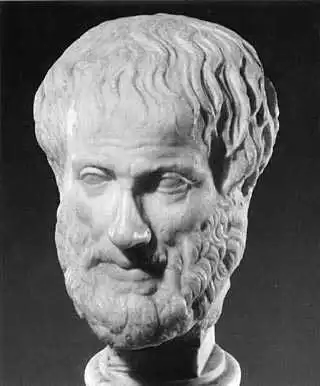 Aristotle.
A mind of his ownAt the opening of the school in the Lyceum, Aristotle was about to be fifty years of age. Among scholars through time, the most debated question has been the timeline and tempo in which Aristotle distanced the views of Plato and developed his own perspective. What is contained in his writing, is mostly and clearly quite separate from the theories of Plato, also in the way Aristotle goes about reaching his conclusions. He had a mind quite different from that of his teacher and from Socrates, as depicted in Plato's books. If nothing had been known about the twenty years Aristotle spent in Plato's school, the link between them would hardly be evident in Aristotle's writing.Unfortunately, what we have of Aristotle's texts are of one kind only the esoteric ones, intended for the closed group of students of his school, maybe just for himself, as notes for lectures of his, or maybe only a written process of thought, a personal tool to progress in his science. These all come from the same source, the collection of manuscripts edited by Andronicus of Rhodes, the last head of the Lyceum, almost 300 years later. That is not the spread of material needed for firm and safe conclusions on the development of Aristotle's thoughts. So, scholars dispute about what time Aristotle started to digress from the theories of Plato, toward his own views. Was it as early as at the formative years in the Academy, or as late as during the time in Lyceum, in the last decade of his life? One thing can be stated for certain: when Aristotle opened the Lyceum in 335, he had his own mind, and any will to sort himself under the system of thoughts formed by Plato must have left him. Otherwise, he would have been happy to join the Academy as one of its teachers. Also, at the age of 50, with about twelve eventful years away from the Academy, Aristotle must have come to trust his own intellectual process, or he never would have. Furthermore, the texts we have, significantly different in both style and content from those of Plato, add up to such a mass, that the twelve years remaining of Aristotle's life would be quite occupied if he were to write them all in this period. In a significantly shorter period, there would just not be enough time. It takes an Aristotle to sort out the dynamics of a mind like that of Aristotle. I believe that the most interest should be focused not on his theories, but the method he had to reach them. We would call his way of thinking extremely systematic and logical. Aristotle himself referred to it as analytics. The term logic, which would do well, too, was introduced by his old friend Xenocrates at the Academy. Now, this capacity and method of Aristotle's brain is likely to have been with him since childhood. It may very well have been the drive in him, making him find his way to the Academy in the first place, instead of staying in Stagira. When Aristotle arrived at the Academy, his analytic process helped him understand Plato's thoughts and theories, which were not that readily attainable for the untrained mind. Plato has proven in his books that he was quite skilled at his dialectic way of reasoning, and logic although not yet called by that name was not beyond his reach. A young Aristotle would have been occupied for a few years, just absorbing and processing all that material, enjoying the intelligence and sharpness it enclosed. Gradually, though, Aristotle must have found anomalies in it, also areas wherein speculation just had to replace strict reason. Later on, he could hardly have withstood the temptation to speculate on his own, even when that led him elsewhere than to Plato's theses. So, in case of the theories formed and supported, Aristotle may have gone through some changes, probably almost from the start and then gradually, until somewhere in his adult life maybe when leaving the Academy in 347 he found himself convinced of things very different from the teachings of Plato. Aristotle found that he had grown up, from being a student of philosophy to becoming a philosopher. I would wager that it happened faster than that, since Aristotle spent as much as twenty years in the Academy. A mind like that of Aristotle would not have needed two decades to discover itself. In Plato's own timeline for studies at the Academy, Aristotle had exceeded both the initial ten years of basic learning and the additional five of dialectic training. He was quite prepared to have a mind of his own, long before he left the Academy. Probably, it was expected of him to express his own opinion on things. Plato and the others at the Academy would have thought less of him, had he not deviated from their conclusions in any way. Aristotle's way of thinking, on the other hand, would have been quite the same, throughout. He analyzed, probably in the kind of steps shown in his writing: learning the different theories, comparing them, questioning them, and then processing the facts and circumstances until reaching his own conclusions. Maybe this process was the essence of Aristotle's teaching at the Lyceum. As for the results of applying this process to the world around them, he hoped that his students would exceed him. The world was big and the unsolved mysteries of it innumerable. There was room for all minds to make their contribution. He just gave them the tools. Actually, this is to a large extent the core also of Plato's teaching, as it is described in his Socratic dialogues.
Aristotle's esoteric writing, then, was the impatient man's way of rushing ahead with a potent method and a limitless field of research. Why would he bother to polish the style of it? There is indeed an impatient panting through the pages of Aristotle's texts, maybe somewhat comparable to what we would call economic writing, or even automatic. A pen running ahead, trying hard not to fall too much behind a rushing mind. Leaving Athens againThere was an end to the rush, when Alexander died in 323. In Athens, the old hatred of anything Macedonian rose anew, and the old tutor of Alexander was a very likely target for it. Aristotle was accused of heresy, because he had compared Hermias to the gods in his eulogy on him, when Hermias had been killed in a brutal way by the Persians. Diogenes quotes it in its entirety:
Aristotle was nonetheless convinced that he was at risk, and fled Athens rather than to stand in court. Aristotle reportedly stated that he wanted to save the Athenians from "sinning twice against philosophy" the first one being the execution of Socrates. Aristotle went to Chalcis, up in the area of his childhood years, and moved into a house that had belonged to his mother. Theophrastus was left in charge of the school. This sad exile was not to last for long at all. The following year Aristotle died of a stomach disorder, at the age of 62.
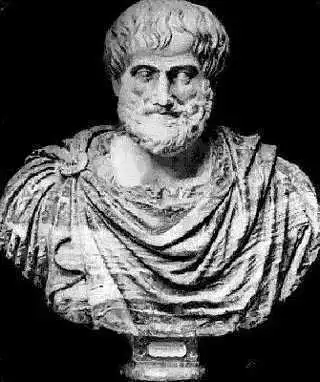 Aristotle.
Aristotle's willDiogenes Laertius had a peculiar interest in the last wills and testaments of the philosophers, quoting several of them in extenso, for example those of Plato, Xenocrates and Aristotle. Although this is generally regarded as yet another example of the superficial and irrelevant approach of Diogenes to the great thinkers, his book containing an abundance of anecdotes and other details with little or no connection to their philosophies, it is indeed a valuable help to any historian. The wills reveal quite a lot about their writers, though material of another nature than that of their philosophical works. They have been used by just about all who have written at some length about the lives of those philosophers.It is evident that the wills quoted by Diogenes have been of great value to all later historians, to the extent where it would be awkward indeed, if they were found to be untrustworthy. There is little to indicate this, though. The details in them match what is understood and commonly accepted about the lives of the philosophers in question, and there are no spectacular revelations made in the wills, contradicting or even absent in other sources. Still, some caution is needed, as always with Diogenes Laertius, since he seems to have been more eager to fill his book with information than to question its reliability a human weakness found in most of us with a similar ambition. Since we want the wills to be authentic, none of us is very likely to question them voluntarily. Again, though, they reveal nothing completely unexpected. The will of Aristotle is quoted in its entirety by Diogenes, but it is not clear at what time it was written. It must have been very late in Aristotle's life, quite likely in the last year of it, when he had moved to Chalcis in 323. As chief executive of it, Aristotle appointed none other than Anitpater, the Macedonian regent, which confirms the close connections he had with the Macedonian court. The will starts with a phrase with a ring of prayer to it: "All will be well; but, in case anything should happen, Aristotle has made these dispositions." And they are plenty, considering not just his own, but also the possible misfortune of others, so that if one given a responsibility or a substantial part of the inheritance should pass away before him, the will mentions another to pass it on to. Aristotle's property, as well as Herpyllis, the woman he lived with, and the children Pythias, from his only marriage, and Nicomachus, his son with Herpyllis, were to be taken care of jointly by Aristomenes, Timarchus, Hipparchus, Dioteles and Theophrastus the last only "if he consent and if circumstances permit him", which was probably a precaution because of hostility toward Aristotle in Athens, where his senior student still remained, in charge of the school at the Lyceum. Evidence of close links between them could have jeopardized Theophrastus' situation in that city. Those five men were not to remain in care of the estate and those left behind, though. Aristotle goes into detail about what to become of it all at length. When Pythias is old enough for marriage, Aristotle rules that it will be to Nicanor. Since Aristotle believed the age of 18 to be ideal for women to marry, she must have been younger than that, at the time of his writing the will. So, she must have been born no earlier than in the beginning of the 330s BC, but probably not later than 335, when Aristotle opened the Lyceum. Most works on his life claim that his marriage lasted no more than about ten years, and since it was commenced in about 347 or 346, that would mean until about 336, a year or so prior to Aristotle's returning to Athens. So, his wife's death may have given him the impulse to leave his northern habitat, as a fresh start or a return to the surroundings of his young years, before the marriage. It is also possible that Pythias died when giving birth to their daughter, which would indeed explain why the girl was given her mother's name. If Pythias, the daughter, was born in 336, she would be 13 at the time of the will. It is increasingly unlikely that she would be much older than that, and certainly not at the age of marriage, 18. So in any case Aristotle's wife must have died within a few years of his departure for Athens. It is therefore quite likely that he had a great deal of affection for his wife giving his daughter the same name, leaving for Athens after her death, and never marrying again. Aristotle's will makes it clear that he cared much for his daughter, too. He regulates what is to be done if she dies, "which heaven forbid and no such thing will happen", but also if Nicanor should die, whether it be before or after their marriage. Also his son Nicomachus, he wants Nicanor to take care of, "as if he were father and brother". Oddly, Aristotle refers to them as 'the children' or 'the boy' and 'the girl', but does not explicitly say that they are children of his. About Herpyllis, too, Aristotle does not specify their relation other than by praising "the steady affection which Herpyllis has borne towards me." Nicanor and the executors are to take care of her, and if she wants to marry, they "shall see that she be given to one not unworthy." She is also to be given money, three handmaids of her choosing in addition to the maid she already has, also a named man-servant. In addition, she shall be given a house on his property, "if she chooses to remain at Chalcis" which does indeed verify that Aristotle lived there at the time of writing the will. If, instead, she prefers to move to Stagira, Aristotle wants her to have his father's house there, which is likely to be where Aristotle was born and raised. There is also a boy, Myrmex, mentioned in the will again to be taken care of by Nicanor, "that he be taken to his own friends in a manner worthy of me with the property of his which we received." It is unclear who this boy may be, evidently not a servant or slave, nor very likely to be a younger brother of Nicomachus. He may be the son of a deceased relative of Aristotle, in his care together with the inheritance from that relative. A slave, Ambracis, is to be given her freedom, and 500 drachmas upon the marriage of Pythias and here Aristotle says "my daughter" as well as a maid. Thale and Simon, in all likelihood servants of Aristotle, are also to be dealt with generously. Three slaves, and a child of one of them, are to be given their freedom upon his daughters marriage. Aristotle wants none of his servants to be sold, but to continue until "when they arrive at the proper age they shall have their freedom if they deserve it." Aristotle also orders for some statues to be set up, one to commemorate the safe return of Nicanor, who therefore must have been elsewhere at the time of the will. Aristotle instructs about his burial: "And wherever they bury me, there the bones of Pythias shall be laid, in accordance with her own instructions." This indicates that Pythias, too, wrote a will, but it is not preserved.
Some texts on Aristotle and his life claim that the will proves a generous character in him, as well as that he had substantial means. The latter, surely, but not necessarily the former. His possessions had to go somewhere, since he could not bring them with him. Nothing odd about that. And freeing his slaves, under some conditions, was nothing unusual in wills of that time. Plato in his will enfranchised a slave of his, and Theophrastus five. On the contrary, the fact that Aristotle had quite a fortune at the end of his days, would imply that he was better at keeping than at spending. What it does prove, however, is his meticulous nature, keen on details, trying any possible outcome, no matter how improbable. Lyceum after AristotleWhen leaving Athens in 323 BC, Aristotle put his closest pupil Theophrastus in charge of the school in the Lyceum. He remained its head until his death in 286, when he was about 85 years of age. According to Diogenes Laertius, his name had been Tyrtamus, but Aristotle had renamed him Theophrastus because of his "graceful style". He had the comic poet Menander among his students. There could be as many as 2000 listening to Theophrastus' lectures. He became so popular in Athens, that when someone tried to prosecute him for impiety, the prosecutor was near to be punished instead. And when a law had been enforced, forbidding any philosopher to be head of a school, whereupon Theophrastus and many other philosophers had to flee the city, within a year the law had been revoked, and the one introducing it was fined five so the philosophers could return. It seems that Theophrastus was one, the Athenians most wanted back.Diogenes Laertius praises his writing, and gives a list of titles, exceeding that of Aristotle but measuring a total of 232, 808 lines, which is about half of the number of lines given for Aristotle's writing. The will of Theophrastus, as well as that of Plato and Aristotle, Diogenes quotes in its entirety. There, he states: "The whole of my library I give to Neleus." This library would be the one assembled in the Lyceum, which he inherited from Aristotle, certainly expanded during his own long period of 37 years as scholarch, and regarded as his own possession, according to custom, no matter in how dire need the school may have been of it. Neleus, though, was one of his students at the school, and seems to have remained there until his own retirement, when he took the books with him to Scepsis (a small town near mythical Troy). Theophrastus may have expected another outcome of it, perhaps one that would lead to the library remaining at the school. Might he have expected Neleus to become the next leader of the school? If so, he was in error. It was Strato who became his successor in 286, and remained so until his death in 268. In Theophrastus' will there is no other mention of Strato, than as one of the seven executors of it, and one of the ten he wishes to be a community to jointly care for the garden of the Lyceum, its walk and houses which would be the school. Neleus is also on both those lists. Strato, on the other hand, arranged for one successor in his will:
In the quote from Strato's will, above, it should be noted that he let Lyco inherit his books, except those of which he was himself the writer. He does not specify what should be done with those books, but by this division he informs us that there were books of some number in his possession then it would be likely that they would include at least some by the school's founder, even if Neleus left with all those he inherited from Theophrastus. And Neleus may have taken those books with him, as a consequence of not agreeing with Strato's leadership of the school. We don't know. There was a continuous succession of school leaders until 86 BC, when the Roman general Sulla on his sacking of Athens made great damage also to the Lyceum and its school. Cicero visited the city in 79 BC, and found nothing remaining of either the Academy or the Lyceum. Andonicus of Thodes may have refounded it, later in the same century, but that is uncertain. Still, by the second century AD it was flourishing, to meet a new disaster in 267, at the destruction of Athens. Peripatetic philospherers continued their work, but elsewhere. It is unlikely that there was much of a school at the Lyceum after that time, and if there was, it made no mark in any contemporary sources.
The mark was made, in due time, by those rolls of text leaving the Lyceum with Neleus to the far-off insignificant little town of Scepsis (in the Troad/Troas), at his retirement from the school, around the middle of the 3rd century BC. They were to be the only direct sources we have to Aristotle's writing, and the only writing of his we have. NEXT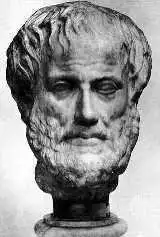
AristotleIntroductionAristotle's LifeTimelineAristotle's PoeticsAristotle's Cosmology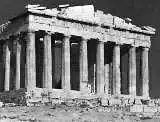
The Greek PhilosophersAbout CookiesMy Other WebsitesCREATION MYTHSMyths in general and myths of creation in particular.
TAOISMThe wisdom of Taoism and the Tao Te Ching, its ancient source.
LIFE ENERGYAn encyclopedia of life energy concepts around the world.
QI ENERGY EXERCISESQi (also spelled chi or ki) explained, with exercises to increase it.
I CHINGThe ancient Chinese system of divination and free online reading.
TAROTTarot card meanings in divination and a free online spread.
ASTROLOGYThe complete horoscope chart and how to read it.
MY AMAZON PAGE
MY YOUTUBE AIKIDO
MY YOUTUBE ART
MY FACEBOOK
MY INSTAGRAM
STENUDD PÅ SVENSKA
|
 Cosmos of the Ancients
Cosmos of the Ancients